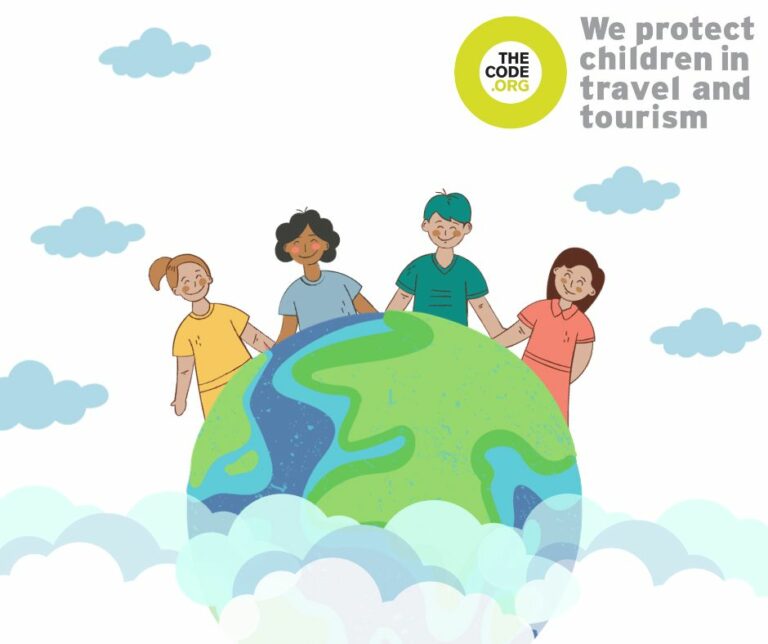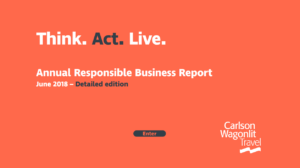Top Members best practices – 1st part
In the first part of the webinar dedicated to sharing of best practices by the Top Members of The Code, the main question was about the process towards elaboration of a policy and procedures for implementing the Six Criteria of The Code. The best practices were share by Der Touristik, Koning Aap-Shoestring YourWay2Go, IHG and Volaris.
Volaris presented their best practices in a separated video that was supposed to be shown in the webinar, though due to technical reasons it was not possible. Their contribution is included in the summary below.
Elaboration of a policy and procedures for child protection/safeguarding
According to the Top Members, the most important was the holistic approach to creation of a policy for child safeguarding in travel and tourism, an analysis of potential risks in the company’s operation areas, and throughout the value chains. Companies highlighted the importance of the employee’s participation in this process.
The work experience of the Mexican airline Volaris – which has been a Top Member for ten consecutive years – shows how policies to prevent the sexual exploitation of children are complemented by action protocols. One of the company’s objectives is to protect its clients, not only in terms of operational security but also to protect their human rights. Volaris developed a policy of zero tolerance towards the illicit transportation of any person, especially children for the purposes of sexual exploitation. They generated protocols and tools that guide the people who work in the company – called Ambassadors – in the identification of suspicious cases during the 3 stages of the flight: Front desk – when checking in; during the boarding process and during the flight. These tools are complemented by rigorous training processes for all operational personn
The policies also include the regulation of the voluntourism. Der Touristik, for their partners/representatives introduced a strict policy of no visits at schools, orphanages, no products offering dances which involve children and no involvement of children in selling. They also put strong requirements for the offers of homestays to protect children, as mentioned by Koning Aap-Shoestring YourWay2Go, during home visits no adult is allowed to stay alone with a child from the visited family – in such case it must be reported.
The compliance mechanism as well as the internal reporting channels are also prepared to monitor respecting of the policies by the employees and the value chain (e.g. Der Touristik).
An important factor mentioned for obtaining a policy of child safeguarding is external expertise, which includes cooperation with NGOs, specializing in the child protection area, in particular in the travel and tourism, and collaboration with other external stakeholders.
Koning Aap-Shoestring YourWay2Go works with ECPAT Netherlands that provided them technical assistance and resources such as infographics on the problematics addressed, to different actors of the tourism and travel sector, and information about how to report. They published it on their website, social media for their customers. Der Touristik tightly works with ECPAT Germany with the same objectives.
IHG is in the process of reviewing their policy and processes, using self-assessment, questionnaires, and external expertise e.g. cooperation with PACT (ECPAT USA) and industry associations. The company has a Human Rights Protection Policy which includes the part addressed to protection of children against exploitation, including sexual exploitation. As it was highlighted, all IHG hotels around the world must respect the policy.
Engagement with stakeholders also includes alliances with key actors. Der Touristik collaborates with the Round Table Human Rights in Tourism, and other NGOs, nationally and internationally. In terms of cooperation with interested parties, Volaris first identifies the interest groups, then those with common objectives and finally approaches them to find complementary work spaces. Among these are the airport and immigration authorities, who receive alerts of suspicious cases and are, therefore, key actors. They also try to cover the value chain by establishing alliances with hotels, transportation services and other partners and service providers, sharing their tools and encouraging them to apply their protection standards. ECPAT-Mexico give the company technical assistance in training processes and in the elaboration and reviewing of their policies and protocols.
The other key elements towards assuring child protection is the training of the staff about the sexual exploitation of children and how to report suspicious cases, as well as preparing of recommendations for the travelers using their services. For example, last year Volaris trained more than 5,500 Ambassadors, the company’s record. The technical support of ECPAT-Mexico has been key support in this process.
Verification of the value chain respecting the child protection/safeguarding policy
Top Members highlight the need to elaborating and following of the Codes of Conduct as by their employees, as by their value chain (Supplier Code of Conduct – Der Touristik) – in case the Code of Conduct is not respected, the contract is ended. Koning Aap included a part of the need of reporting a suspected case of exploitation in their contracts with subcontractors – referring to the Don’t Look Away initiative. There is a procedure of making a complaint defined. The rules/information on the procedures and policy are reminded to the staff and contractors before the holidays season.
The importance of repeating the training on the child protection from exploitation in travel and tourism periodically was confirmed by the Top Members. It was also emphasized that the contractors and local representatives of the company must be verified by the company, and certified, following their selection by study visits to check if the rules, Codes of Conduct and policies are being followed (Koning Aap).
Der Touristik requires their suppliers to commit to the zero tolerance clause included in their contracts. All Top Members focus on the internal communication with their suppliers.
Local Code Representatives (LCR) help by developing procedures for the companies in the industry which they can implement in their value chain (ECPAT Netherlands).
2nd part of the webinar – best practices by Local Code Representatives
The LCR support the companies in preparation of the child safeguarding policies, protocols, procedures, as in the assessment of the risks. ECPAT Mexico highlights the great cooperation with the Mexican Top Member Volaris, which dedicated 27 hours of trainings for creation of the protocols, among others, in preparing the procedures on how to ask the children directly, and in this process they used also the expertise of the LCR.
According to PACT the close understanding and cooperation between the LCR and the Code member is a clue, to understand the context of the company, as well as the importance of the child protection. A clear protocol, and communication is vital for the members of The Code within their organisations.
The important element also is how to cooperate with the public authorities, the LCRs insist on the importance of including this element in the policy and procedures. As it is an important actor in the reporting mechanism, and as for the authorities, also in creating the legislation which would support the companies and LCRs’ effort towards protection of children.
ECPAT Netherlands mentions that in Netherlands there is a special police unit dedicated to the issue, and while reporting they are contacted, though what they lack of is to know if the reported case resulted in proceedings/further actions. As the reporting entity they are not a part of the case and are not informed on the progress. Knowing that there are effects of the reporting could encourage more the sector actors to act and report.
The Top Member, Volaris cooperates on regular basis with the authorities, as, for example, in a case of a suspicious case on the plane, the captain of the crew is required to inform the authorities on the airport of destination. In one of the most touristic states of Mexico, Quintana Roo, they cooperate with the local police, and also with local authorities, and it is planned to open a helpline for children in the Quintana Roo state, where the children could call anonymously and report a suspected case of SEC.



